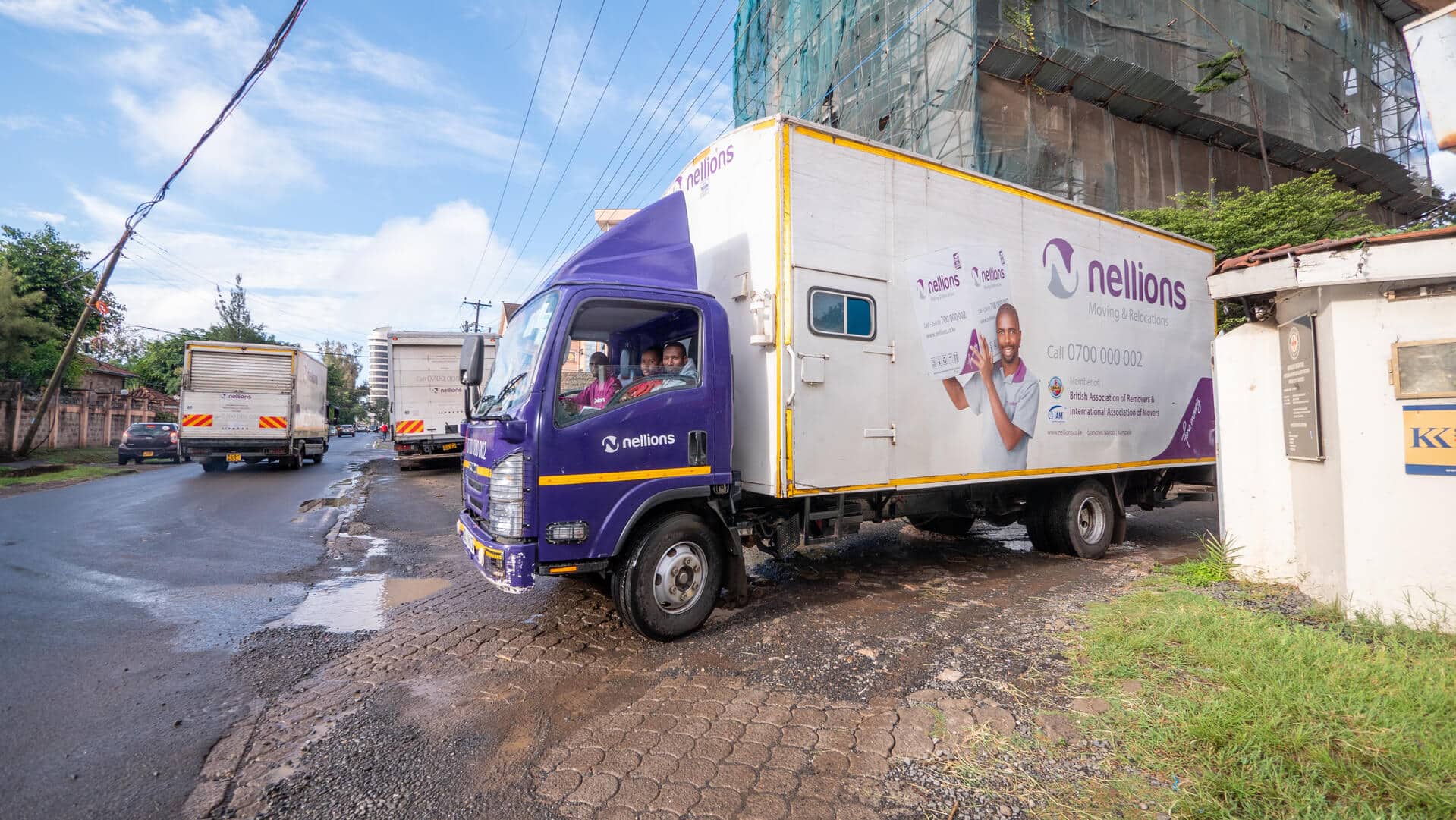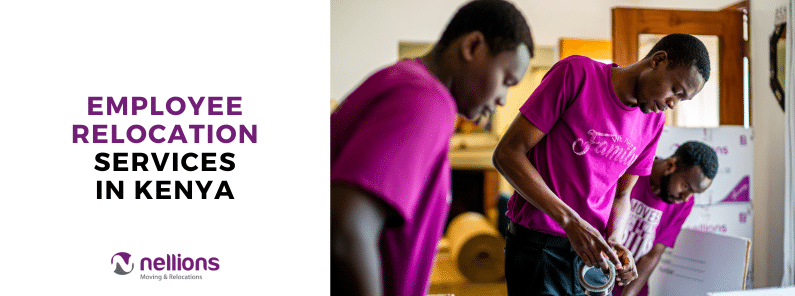When your organization grows and expands—either locally or beyond Kenyan borders—employee mobility becomes a key consideration. Having a clearly defined employee relocation policy ensures a smoother transition for both your company and your employees.
Most importantly, it ensures that your employees feel that their employer cares about their wellbeing especially during the stress-inducing process of moving.
Managed Relocation Services by Nellions
Below, we’ll explore how to draft a relocation policy that addresses the unique needs of HR managers and directors operating in Kenya.
1. Why a Relocation Policy Matters
A relocation policy is more than a set of rules; it’s a roadmap that shapes how employees move to a new role or location. Properly structured policies minimize disruptions by outlining who gets relocated, under what conditions, and how support is offered. For HR managers in Kenya, it’s crucial to consider local labor laws, socio-cultural nuances, and potential moves across East Africa or internationally.
Key Benefits of a Well-Defined Policy
- Retains Top Talent: Employees are more inclined to accept relocation when there’s clarity on financial support, housing, and family assistance.
- Reduces Operational Downtime: Streamlined guidelines prevent confusion, ensuring business continuity.
- Ensures Compliance: A formal approach helps your organization align with Kenyan labor laws, reducing legal risks.
2. Objectives of a Relocation Policy
Before diving into the specifics, define what your policy hopes to achieve. Common objectives include improving employee satisfaction, controlling relocation costs, and maintaining compliance with both local and international regulations. HR managers in Kenya often navigate a dynamic regional landscape—this objective-setting phase helps you stay focused on strategies that align with organizational goals.
Core Objectives to Consider
- Smooth Transitions – Minimize the logistical and emotional strain on employees and their families.
- Cost Efficiency – Create budgets and guidelines that avoid overspending while providing adequate support.
- Legal & Cultural Alignment – Adhere to Kenyan labor rules and accommodate cultural differences, especially for international moves.
3. Understanding the Kenyan Landscape
Kenya’s role as a regional business hub makes it an attractive base for both local and multinational organizations. If your policy doesn’t reflect Kenyan realities—such as visa requirements, local housing norms, and schooling considerations—employees could face avoidable setbacks.
Regional and International Context
- East African Hub: Nairobi’s prominence in finance and technology means you might relocate employees from within East Africa or further abroad.
- Cross-Border Complexity: Processes like securing work permits or coordinating with immigration agencies often require additional planning.
Local Compliance & Regulations
Kenya’s labor laws and immigration policies evolve to keep pace with the region’s growth. Familiarize yourself with the Employment Act of Kenya and other relevant statutes, especially if your organization is planning international assignments. Partnering with legal experts, or at least consulting them during policy drafts, ensures your relocation approach stays above board.
4. Defining the Scope of the Policy
Clarifying the scope of your employee relocation policy helps set expectations from the get-go. This involves specifying who’s eligible for relocation, the types of moves covered, and any exceptions or special cases.
Eligibility Criteria
- Job Role & Seniority: Decide whether certain levels or roles qualify for relocation support.
- Business Needs: If a role’s success hinges on physical presence (e.g., opening a regional office), your policy should reflect that urgency.
Types of Relocations
- Local Moves: Within Nairobi or other Kenyan counties.
- Regional Moves: Across East African borders, involving more complex paperwork.
- International Moves: Where additional immigration support and cultural orientation become essential.
5. Key Components of an Employee Relocation Policy
Once you’ve established your policy’s scope, it’s time to flesh out the details. The following core elements ensure comprehensive coverage and a smoother transition for employees.
Moving & Transportation Logistics

- Packing Services: Will you offer professional packing to protect high-value items?
- Transportation: Outline whether you’ll cover flights, fuel, or moving trucks, and what the employee is responsible for.
- Storage Options: For shorter assignments or interim stays, consider rented storage solutions in Kenya or overseas.
Housing & Accommodation
- Temporary Housing: Provide guidelines for initial housing, including how long it’s covered and how much is budgeted.
- Permanent Housing Allowance: Specify if you’ll reimburse rent deposits or help with property searches.
- Location-Specific Considerations: In Kenyan cities like Mombasa or Kisumu, costs and availability vary significantly compared to Nairobi.
Family & Lifestyle Support

- Schooling Assistance: Offer help locating reputable schools and, where possible, partial tuition support.
- Spousal Employment Assistance: If a spouse wants to work, consider guidance on local opportunities or necessary work permits.
- Orientation & Cultural Training: Especially crucial for international moves. Basic cultural awareness can accelerate adaptation and prevent workplace misunderstandings.
6. Financial & Legal Considerations
A relocation policy without clear financial and legal guidelines can lead to confusion and potential disputes. HR managers in Kenya must pay special attention to cost controls, Kenyan labor laws, and international regulations.
Cost Controls & Allowances
- Budget Caps: Define upper limits for housing, travel, and miscellaneous expenses to manage overall relocation spend.
- Reimbursement Process: Clarify how employees should submit claims and the timeline for reimbursements.
- Tax Implications: Consult your finance/tax department to ensure allowances are structured in compliance with Kenyan revenue rules.
Legal & Regulatory Compliance
- Kenyan Labor Laws: Ensure your policy aligns with the Employment Act and other statutory guidelines.
- Immigration & Work Permits: For regional or international moves, detail the process for obtaining permits in Kenya or the destination country.
- Contracts & Confidentiality: Update employment contracts to reflect any role or location changes and protect proprietary information.
With these financial and legal steps in place, you’ll secure your organization against hidden liabilities while giving employees a transparent framework.
7. Cultural Adaptation & Employee Well-Being
People often underestimate the emotional and cultural impact of relocation, especially when it involves crossing borders or moving to a vastly different environment. HR managers in Kenya should integrate support systems that help employees adapt, maintaining productivity and job satisfaction.
Orientation & Cultural Training
- Introductory Sessions: Provide local etiquette tips and language basics, whether employees are relocating to or from Kenya.
- Community Linkages: Connect transferees with expat or local networks to ease culture shock.
Well-Being & Family Support
- Healthcare & Insurance: Review whether current health plans extend coverage to the new location.
- Psychosocial Resources: Provide access to counseling or mentorship programs to help employees and their families cope with change.
8. Implementation & Monitoring
With the policy’s core elements defined, the next step is rolling it out effectively and continuously refining it for better results.
Structured Rollout
- Training HR Teams: Ensure all HR staff understand every facet of the relocation policy, from benefits to legal compliance.
- Employee Briefings: Hold Q&A sessions or webinars so employees grasp the policy’s details and expectations.
Measuring Success & Gathering Feedback
- Track Key Metrics: Monitor how many relocations occur on budget, on time, and with minimal disruptions.
- Feedback Loops: Conduct surveys or interviews post-relocation to identify pain points. Use this data to refine your policy continuously.
9. Conclusion
Developing a comprehensive employee relocation policy is a strategic move for organizations operating in Kenya. It enhances your ability to attract and retain talent, lowers operational headaches, and preserves morale during transitions. By factoring in Kenyan labor laws, regional mobility demands, and cultural adaptation, HR managers can create a policy that supports employees and advances organizational goals.
Key Takeaways
- Clarity Is King: Define eligibility, financial allowances, and housing options up front.
- Stay Compliant: Keep pace with Kenyan labor statutes, tax implications, and immigration regulations.
- Ongoing Improvement: Gather regular feedback, measure effectiveness, and adapt your policy to evolving realities.
When well-executed, a strong relocation policy empowers your workforce to thrive, whether they move within Nairobi, across East Africa, or to global destinations.
10. How Nellions Can Help You Craft a Bespoke Relocation Policy for Your Organization
A relocation policy that truly supports your team calls for strategic planning, logistical expertise, and region-specific insights. Nellions Moving & Relocations LTD is uniquely positioned to help HR managers in Kenya develop a policy that caters to the diverse needs of local, regional, and international moves.
What Nellions Brings to the Table
- Experience: Having moved over 2,000 households locally and internationally for work purposes, we have an unmatched depth of understanding what smooth employee relocation entails, equipped with the practical tools, relationships and experience to ensure employee satisfaction.
- Expertise in Kenyan and Regional Moves: With branches in Nairobi and Kampala, Nellions understands the intricacies of moving within East Africa—from road networks and customs regulations to cultural sensitivities and local labor laws.
- End-to-End Relocation Support: Beyond physical moving services, Nellions assists with storage, customs clearance, and final delivery—streamlining your policy’s implementation.
- Cost-Efficient, Tailored Solutions: We collaborate with you to balance employee comfort with your organization’s budgetary goals, recommending tailored strategies for everything from packaging to destination services.
- Compliance & Advisory: Our team is well-versed in Kenyan regulations and visa requirements, helping you navigate legal complexities while preserving employee satisfaction.
- Ongoing Feedback & Adjustments: Relocation policies need periodic review; we gather insights throughout the moving process and offer actionable advice to refine your policy for future moves.
By partnering with Nellions, HR professionals can craft a relocation policy that’s both comprehensive and flexible—ensuring that each move, whether local or international, unfolds seamlessly and supports your broader organizational objectives.
FAQ
- What is an employee relocation policy, and why is it important?
An employee relocation policy is a framework that outlines the terms, benefits, and processes for relocating employees to new locations. It ensures smooth transitions, boosts employee satisfaction, minimizes disruptions, and helps organizations remain compliant with legal and financial requirements. - What are the key components of a comprehensive relocation policy?
A comprehensive policy should include eligibility criteria, financial allowances, housing and transportation support, cultural adaptation assistance, family support, and compliance with labor laws. - How can HR managers in Kenya ensure their relocation policy complies with local laws?
HR managers should align their policy with the Employment Act of Kenya, tax regulations, and immigration requirements. Consulting legal experts can ensure full compliance. - What role does cultural adaptation play in employee relocation?
Cultural adaptation helps employees integrate into their new environment by addressing cultural differences, language barriers, and lifestyle changes. It improves employee well-being and productivity during transitions. - How can Nellions assist in creating a bespoke relocation policy?
Nellions offers tailored solutions, including logistics planning, immigration support, and cultural training. They provide expert guidance to design policies that meet organizational and employee needs. - What strategies can help manage relocation costs effectively?
Implementing budget caps, negotiating vendor discounts, and clearly defining reimbursable expenses can help control costs while providing adequate employee support.
How can organizations measure the success of their relocation policy?
Organizations can track metrics like employee satisfaction, retention rates, budget adherence, and the efficiency of relocation timelines. Regular feedback from relocated employees also helps refine policies.










